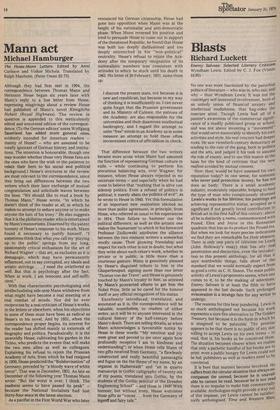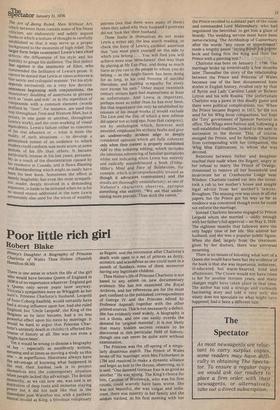Blasts
Richard Luckett
Enemy Salvoes: Selected Literary Criticism Wyndham Lewis. Edited by C. J. Fox (Vision £4.95)
No one was more fascinated by the parochial politics of literature — who was in, who out, and why — than Wyndham Lewis. It was not the custorniary self-interested involvement, born of an unholy union of financial anxiety and intellectual modishness, that hag-rides the insecure artist. Though Lewis had all of a painter's awareness of the commercial significance of a readily publicised group or scho0l. and was not above inventing a "movement" that would serve memorably to identify his own activities and style, his real concern had deeper roots. He saw twentieth-century democracy as tending to the rule of the gang, both in politics and the arts, and judged it his task to assume the role of enemy, and to use this stance as the basis for the kind of criticism that the new mafiosi avoided by mutual consent. How, then, would he have assessed his own reputation today? In one sense, for someone who never paid protection money, he has not done so badly. There is a small academic industry, moderately reputable, helping to feed the type of man who conspicuously shunned Lewis's works in his lifetime; his paintings are achieving representative status, accepted as a significant if not greatly loved contribution to British art in the first half of this century; above all he is distinctly a name, commemorated with Pound, Eliot and Joyce in the Kennerian quadratic that has as its product the Pound era. But when we look for more precise indications we find they are remarkable for their absence. There is only one piece of criticism on Lewis (John Holloway's essay) that has any real penetration and distinction; even the introduction to this present anthology, for all that it says worthwhile things, falls short of the standard that we would normally expect from as good a critic as C. H. Sisson. The main public activity of Lewis's proponents seems, when one comes to it, to be the making of selections: Enemy Salvoes is at least the fifth to have appeared in the last decade. Such prolonged evisceration is a strange fate for any writer to undergo.
The reasons for this bear pondering. Lewis is so much anthologised not because his work represents a sure-fire alternative to The Golden Treasury, but because it is the form in which he is imagined to be palatable. The premise appears to be that there is no public of any size willing to accept Lewis on his own terms — to read, that is, his books as he conceived them. Thesituation becomes clearer when we realise that only a pathetic handful of his books are in print: even a public hungry for Lewis could not be fed; publishers as well as readers need to be convinced.
It is here that matters become involved. He suffers from the circular situation that always It is here that matters become involved. He suffers from the circular situation that always
compasses the unread; because he is unavaid able he cannot be read, because he is not rea there is no impulse to make him commercially available. Anthologies might provide a way out of this impasse, yet Lewis cannot be satisfactorily anthologised. Time and Western Man; The Art of _Being Ruled, Men Without Art, Which between them contain some of his finest criticism, are elaborately and subtly argued books in which a texture of thought is carefully established so that it may serve as a proper background to the moments of high relief. The larger form helps counteract Lewis's two chief defects: the diffuseness of his style and his inability to gauge his audience. The first defect has against it the testimony of Eliot, who commended the brilliance of Lewis's prose. It cannot be denied that Lewis at times achieves a fine satiric and colloquial manner. Yet his style depends excessively on a very few devices: .sentences beginning with conjunctions, the Incantatory doubling of assertions in phrases such as "main and sole" or in the repetition of compounds with a common element (words Prefixed by "time", for instance, are used this way throughout Time and Western Man, but it occurs, in one guise or another, throughout Lewis's work), and the over-working of visual equivalents. Lewis's failure either to conceive of his real aduience or — what is more the reality of such situations — to develop a generalised notion of an audience to which readers could conform was more acute at some Periods of his life than others. It became Particularly intense in his last years, presumahlY as a result of the disorientation caused by his residence in Canada, and it flaws Blasting and Bornbardiering which might so easily have been his best book. Sometimes the effect is Merely laughable; but even the most sympathetic reader, deeply involved in a demanding argument, is liable to be irritated when he is for no sound reason addressed in the tone Lewis Presumably also used for the wives of wealthy
patrons (not that there were many of these) when they asked why their husband's portraits did not 'look like' their husband.
These faults in themselves do not make Lewis a writer any the less worth reading, or check the force of Lewis's cardinal assertion that "you must place yourself on the side to which you belong . . . You will find you will achieve more true 'detachment' that way than by playing at Mr Fair-Play, and doing as much harm as you can to the people to whom you do belong — as the Anglo-Saxon has been doing for so long, in his cold frenzies of suicidal liberalism, and burning sympathy for every race except his own." Other major twentieth century writers have had mannerisms at least as unfortunate. And Lewis is important, perhaps more so today than he has ever been. But that importance can only be established by reissues of his major works (I would exclude The Lion and the Fox, of which a new edition did appear not so long ago, from that category), not by anthologies which, however well intended, emphasise his stylistic faults and give an undeservedly strident edge to deeply considered opinions which are fully coherent only when their context is properly established. Add to this irritating editing, which includes the laborious referencing of familiar quotations whilst not indicating when Lewis has entirely and radically misunderstood a book (FAOMiller's Mind and Face of Bolshevism, for example, which is incomprehensibly treated as though it advocates communism) and the results are thoroughly unsatisfactory; as one of Webster's characters observes, apropos something else entirely, "We see that undermining more prevails/Than doth the canon."
the Prince recoiled to a distant part of the room and commanded Lord Malmesbury, who had
negotiated the betrothal, to get him a glass of brandy. The wedding service must have been nerve-racking. The Archbishop of Canterbury after the words "any cause or impediment" made a lengthy pause "laying (19%-in Ills. prayer book and fixing first the King and then' the
Prince with a piercing eye." ,
Charlotte was born on January 7, 1796. The marriage broke up irretrievably a few months later. Thereafter the story of the relationship between the Prince and Princess of Wales becomes one of the best documented hate stories in English history, rivalled only by that of Byron and Lady Caroline Lamb or Bulwer Lytton and his wife Rosina. The unfortunate Charlotte was a pawn in this deadly game and there were political complications, too. When the Prince became Regent in 1811, he 'did, not send for his Whig boon companions, but kept the 'Tory' government of Spencer Perceval in office. The Whigs were furibus and, following a well-established tradition, looked to the next in succession to the throne. This, of course, enraged the Prince, and he forbade Charlotte from corresponding with her companion, the Whig Miss Elphinstone, to whom she was devoted.
Relations between father and daughter reached their nadir when the Regent, angry at her refusal to marry the Prince of Orange, threatened to remove all her household and incarcerate her at Cranbourne Lodge near Windsor. Charlotte rushed out into the street, took a cab to her mother's house and sought legal advice from her mother's lawyer, Brougham. The ensuing row was soon in all the papers, but the Prince got his way as far as residence was concerned though even he could not enforce the marriage.
Instead Charlotte became engaged to Prince Leopold whom she married — oddly enough with her father's full approval — on May 2, 1816. The eighteen months that followed were the only happy time of her life. She adOred her husband, and she was a popular public figure. When she died, largely from the treatment given by her doctors, there was universal mourning.
There is no means of knowing what sort of a Queen she would have been but the evidence of the book is that she was impetuous, indiscreet, ill-educated, but warm-hearted, kind and affectionate. The Crown would not have come to her for another thirteen years, and many changes might have taken place in that time. The author has told a strange and curiously fascinating story and told it very well; she wisely does not speculate on what might have happened, had it been a different tale.



























 Previous page
Previous page